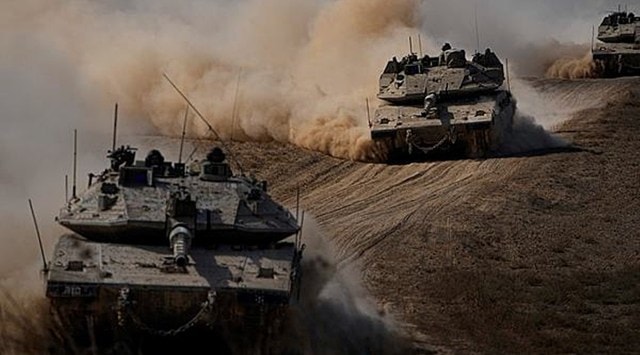Stay updated with the latest - Click here to follow us on Instagram
Israel-Hamas war: what has happened & what caused the conflict — your FAQs answered
On October 7, Hamas militants, backed by a barrage of rockets, stormed from the blockaded Gaza Strip into nearby Israeli towns, killing hundreds and abducting others in an unprecedented surprise attack.
 Israeli tanks head towards the Gaza Strip border in southern Israel on Friday, Oct.13, 2023. (AP Photo)
Israeli tanks head towards the Gaza Strip border in southern Israel on Friday, Oct.13, 2023. (AP Photo) Almost one week after Palestinian militants launched a surprise attack on Israel from the Gaza Strip, tensions have escalated with the conflict claiming approximately 2,800 lives on both sides. Israel’s counter offensive on the Hamas was to declare a state of war and massive military mobilisation. While a majority of countries have condemned Hamas’ attack on Israel, some have backed the Palestinian cause.
On October 7, Hamas militants, backed by a barrage of rockets, stormed from the blockaded Gaza Strip into nearby Israeli towns, killing hundreds and abducting others in an unprecedented surprise attack. Israel swiftly responded with airstrikes and military counter-attacks, ultimately declaring a state of war. On the sixth day of the war, Israel Friday called on all civilians in the northern half of the Gaza Strip, which has a population of more than 1 million people, to relocate south within 24 hours ahead of a likely ground offensive.
- 01
What is the current ground situation?
Hamas said it had launched 150 rockets at Israel, as a response to the “displacement and targeting of civilians." Earlier, the Israeli military had announced that around 1.1 million civilians would be evacuated from Gaza city, “for their own safety”, within 24 hours. Israel has said that it will continue to “operate significantly” in the area in the coming days, and residents will be allowed to return only when an announcement permitting them to do so will be made.
 Israeli soldiers inspect the burnt car of a festival-goer at the site of an attack on the Nova Festival by Hamas gunmen from Gaza, near Israel's border with the Gaza Strip, in southern Israel, October 13, 2023. (Reuters)
Israeli soldiers inspect the burnt car of a festival-goer at the site of an attack on the Nova Festival by Hamas gunmen from Gaza, near Israel's border with the Gaza Strip, in southern Israel, October 13, 2023. (Reuters)The United Nations Palestinian Refugee Agency (UNRWA) said it relocated its central operations centre and international staff to Gaza’s south, and also urged Israel to protect all civilians in its shelters. The ongoing war has claimed at least 2,800 lives on both sides, according to AP.
- 02
Why did Hamas attack Israel?
The military conflict between Israel and the Gaza Strip-based militant group Hamas began exactly 14 months after the truce that ended the brief confrontation between Israel and the Palestinian Islamic Jihad on August 7, 2022. The answer to why Hamas attacked Israel on October 7, lies in a mix of internal, political, religious, and geopolitical reasons.
- There has been no movement on the stalled Israeli-Palestinian peace talks for several years now. Barring the failed Trump Peace Plan of January 2020, no serious efforts have been made to resolve the longstanding dispute. Moreover, as moderate Arab countries increasingly move to normalise ties with Israel, Hamas has sought to bring the ‘ignored’ Palestinian cause back in the spotlight.
- Israel’s government, formed in late December 2022, is considered the most hardline in its history. There have been talks of expanding Jewish settlements into Palestinian lands, and the possibility of annexing part of the West Bank looms large.
- There is a growing perception in Palestinian society that Israel’s diplomatic recognition and political acceptance are on the rise in the wider Middle Eastern region. Striking Israel at this juncture, and provoking the inevitable heavy retaliation which would likely draw regional and international condemnation, could be part of Hamas’ plan to derail the probable Israeli-Saudi agreement - an agreement which could mean recognising Palestine as an independent state is no longer a priority for the Arab world, of which Saudi Arabia is the leader.
 Palestinians take part in a protest following Israeli strikes on Gaza, in Hebron, in the Israeli-occupied West Bank, October 13, 2023. (Reuters)
Palestinians take part in a protest following Israeli strikes on Gaza, in Hebron, in the Israeli-occupied West Bank, October 13, 2023. (Reuters) - 03
How did Israel retaliate?
After initial chaos, Israel's military scrambled into action by firing back missiles at Gaza and sending in a massive number of military troops to halt Hamas' attack on them. Israeli President Netanyahu declared war, while the military has claimed that over 6,000 Israeli bombs have struck Gaza since October 7. While Israel says it is striking Hamas targets, many civilians have been killed in the process - Gaza’s Ministry of Health said Thursday that 22 entire families have perished. In addition to attacking roads and buildings in Gaza, local news outlets reported attacks by Israeli forces on airports in Damascus and Aleppo.
 The remains of a family home is seen, following a mass infiltration by Hamas gunmen from the Gaza Strip, in Kibbutz Beeri in southern Israel, October 13, 2023. (Reuters)
The remains of a family home is seen, following a mass infiltration by Hamas gunmen from the Gaza Strip, in Kibbutz Beeri in southern Israel, October 13, 2023. (Reuters)Israel's Minister for Energy on Thursday also declared that they will cut off Gaza from electricity, food, water, or fuel supply until Israeli hostages taken by Hamas militants are released. Israel has called for complete siege of the Gaza Strip, and said there would be no pause in it.
- 04
What has been India’s reaction to the attacks?
Hours after Hamas' first attacks on Gaza on October 7, Prime Minister Narendra Modi, on a post on X, expressed shock at the Palestinian offensive, and conveyed “solidarity with Israel”. He wrote, "“Deeply shocked by the news of terrorist attacks in Israel. Our thoughts and prayers are with the innocent victims and their families. We stand in solidarity with Israel at this difficult hour."
#WATCH | MEA Spokesperson Arindam Bagchi says, "There is a universal obligation to observe international humanitarian law. There is also a global responsibility to fight the menace of terrorism in all its forms & manifestations..." pic.twitter.com/WPKDa7Wj4a
— ANI (@ANI) October 12, 2023
However, five days later, in its first official statement on the Israel-Hamas war, New Delhi has sought to nuance this. Ministry of External Affairs’ official spokesperson Arindam Bagchi, in response to questions at the weekly briefing, said that there is a “universal obligation to observe international humanitarian law,” and there is also a global responsibility to fight the menace of terrorism in all its forms and manifestations. In addition, Bagchi further cleared that India advocates for "the resumption of direct negotations towards establishing the sovereign, independent and viable state of Palestine living within secure and recognised border side by side with Israel."
- 05
How has the world reacted?
The new developments in the longstanding tensions between Israel and Palestine have seen several countries throw in their weight behind each side. While Britain, the US, France, Japan, Canada, Germany, Ukraine, and Spain, among others, condemned Hamas; Russia, Egypt, Iran, Iraq, and Turkiye were among some countries which backed the Palestinian cause. However, since the violence, death, and disaster escalated, most leaders worldwide have called for a ceasefire.
 U.S. Secretary of State Antony Blinken, left, shake hands with Palestinian President Mahmoud Abbas, in Amman, Jordan, Friday Oct. 13, 2023. (AP Photo)
U.S. Secretary of State Antony Blinken, left, shake hands with Palestinian President Mahmoud Abbas, in Amman, Jordan, Friday Oct. 13, 2023. (AP Photo)US Defense Secretary Lloyd Austin arrived Friday in the Israeli city of Tel Aviv to meet with senior government leaders and see firsthand some of the US weapons and security assistance that Washington rapidly delivered to Israel in the first week of its war with the militant Hamas group. Austin is the second high-level US official to visit Israel in two days which comes a day after Secretary of State Antony Blinken arrived in the region on Thursday. Blinken is continuing the frantic Mideast diplomacy, seeking to avert an expanded regional conflict.
- 06
A look into the history of conflict between Israel and Palestine
The conflict between Israel and Palestine began just under a century ago, but the significance of the land precedes even Biblical times. The area in question covers a tiny swathe of the Southern Levant, bordering Lebanon, Syria, Jordan, Egypt and the Mediterranean Sea. With perpetually shifting borders, accusations of segregation and claims of historical significance, the region has served as a fierce battleground between Jews, Arabs, and Palestinians, backed by a rotating cast of states including the UK, America, France, Iran, and Turkiye.







- 01
- 02
- 03
- 04
- 05


 Israeli soldiers inspect the burnt car of a festival-goer at the site of an attack on the Nova Festival by Hamas gunmen from Gaza, near Israel's border with the Gaza Strip, in southern Israel, October 13, 2023. (Reuters)
Israeli soldiers inspect the burnt car of a festival-goer at the site of an attack on the Nova Festival by Hamas gunmen from Gaza, near Israel's border with the Gaza Strip, in southern Israel, October 13, 2023. (Reuters) Palestinians take part in a protest following Israeli strikes on Gaza, in Hebron, in the Israeli-occupied West Bank, October 13, 2023. (Reuters)
Palestinians take part in a protest following Israeli strikes on Gaza, in Hebron, in the Israeli-occupied West Bank, October 13, 2023. (Reuters) The remains of a family home is seen, following a mass infiltration by Hamas gunmen from the Gaza Strip, in Kibbutz Beeri in southern Israel, October 13, 2023. (Reuters)
The remains of a family home is seen, following a mass infiltration by Hamas gunmen from the Gaza Strip, in Kibbutz Beeri in southern Israel, October 13, 2023. (Reuters) U.S. Secretary of State Antony Blinken, left, shake hands with Palestinian President Mahmoud Abbas, in Amman, Jordan, Friday Oct. 13, 2023. (AP Photo)
U.S. Secretary of State Antony Blinken, left, shake hands with Palestinian President Mahmoud Abbas, in Amman, Jordan, Friday Oct. 13, 2023. (AP Photo)





















